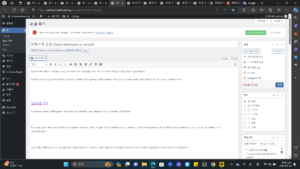Questions about delinquency records are actually one of the most frequently asked questions.
Credit reporting companies typically retain delinquency information for up to three years and factor it into your credit score.

However, when delinquent records are cleared may depend on a variety of factors.
For example, the size of the delinquent amount, the length of the delinquency period, and the frequency with which delinquencies occur may be taken into consideration.
Typically, delinquency records are removed from your credit report a certain period of time after repayment has been completed.
However, the exact timing of deletion may vary depending on the policy of the credit rating company, so it is recommended that you contact the credit rating company directly or seek advice from relevant agencies such as the Financial Supervisory Service.
Delinquent record deletion period
The timing of sharing and deleting overdue records varies depending on the overdue amount, number of days overdue, and number of overdue payments.
Please refer to the table below!
Category Overdue amount Number of overdue cases Number of days overdue Overdue records and sharing period
short-term delinquency
1 case over 100,000 won, over 5 business days, shared with credit rating agencies and financial institutions
2 cases of 100,000 won or more 3 years after repayment of 5 business days or more
1 case over 300,000 won: 1 year after repayment for more than 30 days
1 case of long-term delinquency of KRW 1 million or more; 5 years after repayment for more than 90 days
If you default on your loan or credit card payments, there are two main disadvantages:
sharing financial sector
Delinquent information is shared with various financial institutions such as banks, securities companies, savings banks, capital companies, and credit card companies.
This is used as important information by relevant institutions when assessing a customer’s credit risk, and if delinquent information is shared, the customer may face disadvantages such as loan rejection or high interest rates when making future financial transactions.
Credit score reflected
Delinquency history is reflected in your credit score by credit rating agencies (e.g. NICE, KCB, etc.).
Credit scores are used as an important standard when financial institutions provide financial services such as loan approval, credit card issuance, and interest rate determination. If a delinquency record is reflected in the credit score, the credit score will drop and use of financial services may be restricted. can.
How to check delinquent records
You can easily search through credit information companies NICE and KCB.
NICEJikimi
Go to NICE Keeper
NICE Keeper is a credit information inquiry service operated by NICE Rating Information Co., Ltd. that helps individuals easily check their credit status. To use this service, simply follow the steps below:
Visit the NICE Keeper website: First, access the NICE Keeper website.
Login: If you have a NICE Keeper account, log in. If not, register as a member.
Check delinquency status: After logging in, go to the Protected Financial Life section of the homepage and select the delinquency status menu.
Check delinquency records: In this menu, you can check an individual’s short-term and long-term delinquency records. This will help you understand your delinquency status and its impact.
KCB (all credit)
All Credit is a credit information inquiry service operated by Korea Credit Bureau.
Go to All Credit (KCB)
This service allows individuals to check their short- and long-term delinquency history, including their credit status. Here’s how to check your delinquency record using All Credit:
Visit the All Credit website: First, access the All Credit website.
Login: If you already have an account, log in. If you do not have an account, sign up.
Check delinquent record: After logging in, go to the My Service menu on the homepage and select delinquent information.
Check delinquency history: In this menu, you can check an individual’s long-term and short-term delinquency history. This will give you an overall understanding of your delinquency status and credit health.